|
|
|
Sort Order |
|
|
|
Items / Page
|
|
|
|
|
|
|
| Srl | Item |
| 1 |
ID:
188254
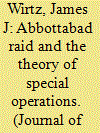

|
|
|
|
|
| Summary/Abstract |
When ‘The Theory of Special Operations’ was written in 1993 by then Commander William H. McRaven, USN, Al Qaeda was barely on the strategic horizon. Nevertheless, this thesis helped shape the denouement of the horrible tragedy that befell the world on 11 September 2001. This article describes McRaven’s work and traces its influence on the 2011 Abbottabad Raid. It also identifies how the theory might be modified to better capture the civil-military nexus at the apex of the strategic use of special operations forces.
|
|
|
|
|
|
|
|
|
|
|
|
|
|
|
|
| 2 |
ID:
188251
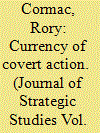

|
|
|
|
|
| Summary/Abstract |
At the start of the 1960s, the UK embarked on a programme of covert action in Latin America. This appears puzzling: the UK was overstretched; Latin America fell outside its area of strategic interest; and UK covert action was dwarfed by that of the US. After revealing this activity for the first time, this article argues that the UK turned to covert action for reasons beyond orthodox explanations of reducing threats in a plausibly deniable manner. Instead, policymakers recognised the currency of covert action in the Anglo-American relationship and in generating trade with emerging economies in Latin America.
|
|
|
|
|
|
|
|
|
|
|
|
|
|
|
|
| 3 |
ID:
188253


|
|
|
|
|
| Summary/Abstract |
This paper analyses the dynamics of violence during civilian displacement operations. Specifically, we argue that the integration of security forces – solid command structure, monitoring of troops, and the quality of personnel – influences not only the military performance but also the level of civilian costs. That is, a highly integrated army can commit soldiers to displacement operations while minimising violence. When conducted by a partially integrated army, however, displacement operations are at risk of mass killing, pushing soldiers to remove civilians without sophisticated control. Our qualitative analysis of three major counter-guerrilla operations in South Korea provides support for our thesis.
|
|
|
|
|
|
|
|
|
|
|
|
|
|
|
|
| 4 |
ID:
188246
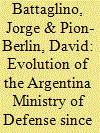

|
|
|
|
|
| Summary/Abstract |
Through a progressive strengthening of organizational, legal, and personnel attributes, Argentina's Ministry of Defense has become civilianized. The MOD has been strengthened by the addition of new bureaucratic units headed by civilians with the authority to shape and conduct defense policy while also encouraging interactions with military personnel, resulting in better informed policy choices. This article will account for these changes through a detailed analysis of foreign affairs, strategic planning and promotions, production and research, and education. Procedural rules, divisions of labor and civil-military interactions are delineated. Military modernization deficiencies and the need for a permanent civilian staff are noted.
|
|
|
|
|
|
|
|
|
|
|
|
|
|
|
|
| 5 |
ID:
188248
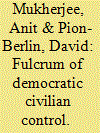

|
|
|
|
|
| Summary/Abstract |
In this introduction we present the justification and the analytical frame of our special issue. More specifically, this issue examines the institutional role of defence ministries in fortifying civilian control and military effectiveness. As we argue, scholarship on this subject is sparse, despite the ministry’s importance in enforcing civilian control, enhancing military effectiveness, and conducting the day-to-day affairs of national defense. If defence ministries are to fulfill these obligations, they must be properly positioned, financially and bureaucratically endowed, as well as staffed with knowledgeable civilians with sufficient authority. Not all ministries are up to these standards. To highlight these aspects, our special issue examines the defense ministries of four countries, two of which are older democracies (France and India) and two more recently established ones (Argentina and South Korea). These case studies pay particular attention to organizational design of the ministries, the roles assigned to civilian and military personnel, how much defense expertise civilians and officers can claim, and whether there are mechanisms that allow ministry personnel to convert resources into military strength. We underscore our contribution to the literature and suggest avenues for further research.
|
|
|
|
|
|
|
|
|
|
|
|
|
|
|
|
| 6 |
ID:
188258
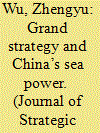

|
|
|
|
|
| Summary/Abstract |
This paper is an academic review of Red Star over the Pacific: China’s Rise and the Challenge to US Maritime Strategy (2nd Edition). It starts with a critical review of the book’s analytical framework for interpreting the development of China’s sea power in the previous decades. Then it scrutinizes respectively the book’s discussions of the logic and grammar of China’s sea power, and reveals simultaneously the contradictions embedded in China’s maritime policy and practice today. The paper ends up with an evaluation of the prospects of China’s sea power and its implications in view of the contradictions revealed.
|
|
|
|
|
|
|
|
|
|
|
|
|
|
|
|
| 7 |
ID:
188257


|
|
|
|
|
| Summary/Abstract |
In the wake of new academic and government attention paid to China’s growing Arctic security interests, this article examines the strategic advantages which may lead China to deploy submarines into the polar waters as well as the disadvantages and dangers inherent in such a mission. In contrast to the general belief that such an under-ice presence is both imminent and dangerous to the US and its allies, this piece suggests a more nuanced appreciation for the limited value of the Arctic as a realm of Sino-American competition.
|
|
|
|
|
|
|
|
|
|
|
|
|
|
|
|
| 8 |
ID:
188247
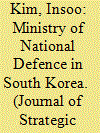

|
|
|
|
|
| Summary/Abstract |
South Korea’s transition from military-controlled authoritarianism to consolidated civilian-dominated democracy is widely considered a success story. However, civilians’ roles within the MND remain severely limited due to the institutional design of the MND. A decentralised structure emerged in the MND, delegating policy decision-making in critical areas to professional soldiers. Data analysis on 1,060 employees in 21 MND departments shows a clear cut between the military domain and the civilian domain within the MND, which enabled the military to thwart 30 years of civilian efforts to reform the military structure without challenging the principle of civilian supremacy.
|
|
|
|
|
|
|
|
|
|
|
|
|
|
|
|
| 9 |
ID:
188256
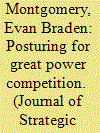

|
|
|
|
|
| Summary/Abstract |
The United States has adjusted its nuclear posture recently by adding nonstrategic weapons to its arsenal and raising the prospect of nuclear retaliation for nonnuclear attacks against command-and-control systems. Critics argue the former change is too dangerous due to the discrimination problem, while the latter change is too draconian due to the proportionality problem. I argue instead that new capabilities introduce a magazine depth problem, while new threats introduce an opportunistic aggression problem. This suggests that changes in force structure are not as dangerous as critics suggest, while changes in declaratory policy are more dangerous than they realize.
|
|
|
|
|
|
|
|
|
|
|
|
|
|
|
|
| 10 |
ID:
188252


|
|
|
|
|
| Summary/Abstract |
This article aims at clearing up a widespread misunderstanding in previous research that the classical strategic perspective, based on the writings of Carl von Clausewitz and his contemporary followers, shares ontological assumptions with realism. Although both perspectives perceive a constant state of disharmony in international politics, they differ substantially in their assumptions about state-centrism, actor behaviour, and the role of unpredictability. As the relationship between the perspectives is ambiguous, the article argues that scholars should treat them as two separate theoretical entities. The greater scholarly relevance of the article lies in its contribution to conceptual clarity.
|
|
|
|
|
|
|
|
|
|
|
|
|
|
|
|
| 11 |
ID:
188250
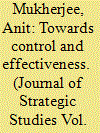

|
|
|
|
|
| Summary/Abstract |
This article analyses India’s Ministry of Defence and its influence on civil-military relations. It argues that, until very recently, the strategic intent of the defence ministry has primarily focused on civilian control over the military. The resultant institutional structure of civilian control compromised the effectiveness of the Indian military. This was due to several features of the country’s model of civilian control, including a lack of civilian expertise, bureaucratic procedures underlying civil-military interactions as well as military autonomy. Acknowledging these problems, the government has currently embarked on reforms to maximize military power. It is doing so mainly by infusing military expertise at the ministerial level. However, this may upend the civil-military dynamic in India and the success of this initiative remains to be seen. Conceptually, this article examines a possibly pernicious effect of a civilian dominated ministry and highlights the importance of expertise in enhancing both control and military effectiveness.
|
|
|
|
|
|
|
|
|
|
|
|
|
|
|
|
| 12 |
ID:
188255
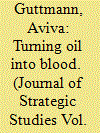

|
|
|
|
|
| Summary/Abstract |
How can multilateral liaison be used as a tool to counter state-sponsored terrorism? This article analyses cooperation among 18 Western European intelligence agencies to counter Libyan-Palestinian terrorism in Europe in the early 1970s. Two arguments are presented. Concerning Western perceptions of Palestinian-Libyan operations, the article argues that the intelligence reports overestimated Libyan influence over Palestinian actions. Concerning intelligence cooperation, the article argues that intelligence was shared to collectively understand the threat posed by Libya but also to send implicit political messages. The article is based on unprecedented access to records from a multilateral liaison called the Club de Berne.
|
|
|
|
|
|
|
|
|
|
|
|
|
|
|
|
| 13 |
ID:
188249
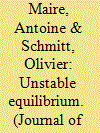

|
|
|
|
|
| Summary/Abstract |
French civil-military relations under the 5th Republic are marked by the imposing figure of the President, because of their role in nuclear deterrence. In that context, the role of the ministry of defence in general, and of its leader (the minister) in particular, is ambiguous: the minister is technically not the highest authority in charge of defence issues (since both the Prime Minister and the President are constitutionally tasked with important responsibilities in the defence realm), but they nevertheless need to find a role between the presidential guidelines and the military demands. In this article, we show that civil-military relations within the French ministry of Defence are therefore characterized by an “unstable equilibrium”: the history of the French MoD is rife with regular swings between the primacy of the military or the primacy of civilians. Overall, the French MoD has adopted a model civil-military relations which is structurally unstable, due to the shifting legitimacy of the military elite within the French bureaucracy and the importance of the personality of the political and military actors involved: without fundamentally altering bureaucratic rules and organization, the power balance between civilian and military actors can quickly evolve. To a degree, this shows the plasticity of French civil-military relations and its ability to adapt to the actors involved, especially the President.
|
|
|
|
|
|
|
|
|
|
|
|
|
|
|
|
|
|
|
|
|